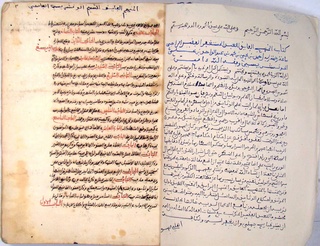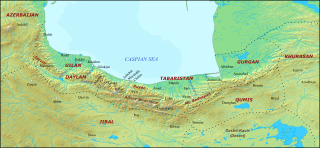ʿIlm al-kalām, usually foreshortened to kalām and sometimes called "Islamic scholastic theology" or "speculative theology", generally speaking, is the philosophical study of Islamic doctrine ('aqa'id). It was born out of the need to establish and defend the tenets of the Islamic faith against the philosophical doubters. However, this picture has been increasingly questioned by scholarship that attempts to show that kalām was in fact a demonstrative rather than a dialectical science and was always intellectually creative. It is also important to note that the definition of Kalam has changed depending on the time and context and who it was used by.

A vizier, or wazir, is a high-ranking political advisor or minister in the near east. The Abbasid caliphs gave the title wazir to a minister formerly called katib (secretary), who was at first merely a helper but afterwards became the representative and successor of the dapir of the Sassanian kings.

Abū Manṣūr Muḥammad b. Muḥammad b. Maḥmūd al-Ḥanafī al-Māturīdī al-Samarḳandī, often referred to as Abū Manṣūr al-Māturīdī for short, or reverently referred to as Imām al-Māturīdī by Sunnī Muslims, was a Muslim scholar of Ḥanafī jurisprudence, scriptural exegete, reformer (mujaddid), and scholastic theologian (mutakallim), renowned for being the eponymous founder of the Māturīdī school of Islamic theology, which became the dominant Sunnī school of Islamic theology in Central Asia, and later enjoyed a preeminent status as the theological school of choice for both the Ottoman Empire and the Mughal Empire.

The Encyclopaedia of Islam (EI) is a reference book that focuses on the academic study of Islam. It is published by Brill and provides information on various aspects of Islam and the Islamic world. It is considered to be the standard reference work in the field of Islamic studies. The first edition was published in 1913–1938, the second in 1954–2005, and the third was begun in 2007.
Usha Sanyal is an American scholar and historian. Her PhD dissertation analysed the Islamic legal scholar Ahmed Raza Khan Barelvi. She is Visiting assistant professor of history at Wingate University in North Carolina.

Clifford Edmund Bosworth FBA was an English historian and Orientalist, specialising in Arabic and Iranian studies.

The Otaibah is one of the biggest Arab tribes originating in the Arabian Peninsula. Their distribution spans throughout Saudi Arabia, especially in Najd. and the Middle East. The Otaibah are descended from the Bedouin. They trace back to the Mudar family and belong to the Qays ʿAylān confederacy through its previous name, Hawazin.
Nass is an Arabic word variously translated as "a known, clear legal injunction," a "divine decree", a "designation", "written law" as opposed to unwritten law, "canonical text" that forbids or requires, a "textual proof".
Abu Imran Musa ibn Isa ibn abi hajjal-Fasi was a Moroccan Maliki faqīh born at Fez to a Berber or Arab family whose nisba is impossible to reconstruct.
Yūsuf ibn ʿAbd Allāh ibn Muḥammad ibn ʿAbd al-Barr, Abū ʿUmar al-Namarī al-Andalusī al-Qurṭubī al-Mālikī, commonly known as Ibn ʿAbd al-Barr was an eleventh-century Maliki scholar and Athari theologian who served as the Qadi of Lisbon. He died in December 2, 1071 (aged 93).

Abu Ya`qub Yusuf or Yusuf I was the second Almohad Amir or caliph. He reigned from 1163 until 1184 in Marrakesh. He was responsible for the construction of the Giralda in Seville, which was part of a new grand mosque. He was a keen student of philosophy and patron of Averroes.
Roger Mervyn Savory was a British-born Professor Emeritus at the University of Toronto who was an Iranologist and specialist on the Safavids. His numerous writings on Safavid political, military history, administration, bureaucracy, and diplomacy-translated into several languages have had a great impact in understanding this period.
Wolfhart P. Heinrichs was a German-born scholar of Arabic. He was James Richard Jewett Professor of Arabic at Harvard University, and a co-editor of the second edition of the Encyclopaedia of Islam. He taught Classical Arabic language and literature, particularly Arabic literary theory and criticism.
Abdallāh ibn Aḥmad ibn Muḥammad, better known as Ibn al-Mughallis, was a medieval Arab Muslim theologian and jurist.
Abu Muhammad Abd Allah bin Muhammad bin Qasim bin Hilal bin Yazid bin 'Imran al-'Absi al-Qaysi was an early Muslim jurist and theologian.
Beheading was a standard method of execution in pre-modern Islamic law. By the end of the 20th century, its use had been abandoned in most countries. Beheading is still a legal method of execution in Saudi Arabia, Qatar, and Yemen. In Iran, beheading was last used in 2001 according to Amnesty International, but it is no longer in use. In recent decades, extremist Salafi jihadist groups have used beheading as a method of killing captives and terror tactic.

Ahmad ibn Yahya al-Wansharisi was a Maghrebi Berber Muslim theologian and jurist of the Maliki school around the time of the fall of Granada. He was one of the leading authorities on the issues of Iberian Muslims living under Christian rule.
Siyasa (سياسة) is an Arabic term associated with political authority. In pre-modern Islamic literature it was used to refer to statecraft and management of the affairs of the state. This usage has given rise to the sense of "politics" that the word has in modern Arabic. In classical Islamic works of Greek-influenced political theory, such as al-Farabi's al-Siyasa al-Madaniyya, the term refers to a branch of philosophy that studies the art of managing a polity. In Sunni Islamic jurisprudence (fiqh), the term appears in the phrase siyasa shar'iyya, which literally means governance according to sharia. The phrase refers to the doctrine, sometimes called the political dimension of Islamic law, which was elaborated in the late medieval period in an attempt to harmonize Islamic law with the practical demands of statecraft. The doctrine emphasized the religious purpose of political authority and advocated non-formalist application of Islamic law if required by expedience and utilitarian considerations. It first emerged in response to the difficulties raised by the strict procedural requirements of Islamic law, which rejected circumstantial evidence and insisted on witness testimony, making criminal convictions difficult to obtain in courts presided over by qadis. In response, Islamic jurists permitted greater procedural latitude in limited circumstances, such as adjudicating grievances against state officials in the mazalim courts administered by the ruler's council and application of "corrective" discretionary punishments for petty offenses. However, under the Mamluk sultanate, non-qadi courts expanded their jurisdiction to commercial and family law, running in parallel with sharia courts and dispensing with some formalities prescribed by fiqh. Further developments of the doctrine attempted to resolve this tension between statecraft and jurisprudence. In later times it has been employed to justify legal changes made by the state in view of public interest, as long as they are not contrary to sharia. It was invoked by Ottoman rulers to promulgate a body of administrative, criminal, and economic laws known as qanun.

Ruyan, later known as Rustamdar (رستمدار), was the name of a mountainous district that encompassed the western part of Tabaristan/Mazandaran, a region on the Caspian coast of northern Iran.







